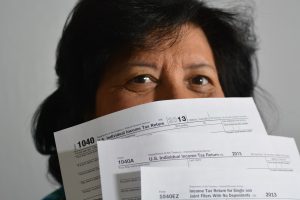How moving can lower your federal income tax
Federal tax rates are the same for everyone, right?
So how could your federal taxes be lower if you moved?
 A lot of us are going to relocate in coming years, as the effects of climate change hit America’s coasts. I suggest you put federal taxes on your checklist when shopping for a new hometown.
A lot of us are going to relocate in coming years, as the effects of climate change hit America’s coasts. I suggest you put federal taxes on your checklist when shopping for a new hometown.
Consider this example. You and your recent classmate are both nurses. You have roughly the same experience, the same duties. You make $94,000. He makes $61,000. Is that unfair?
Not in the direction you may think. Your classmate works at Mercy Medical Center in Des Moines. You are at Santa Clara Valley Medical Center in San Jose. Your rent is $1,538/mo; his is $586 for a similar apartment and neighborhood. Yes, you earn 54 percent more than he does, but you pay nearly three times as much for housing.
Your monthly energy costs are $280; his are $145. An electrician’s visit costs $218 in San Jose; $65 in Des Moines. You get the idea. When everything is counted up, you would need to earn $105,000, not $94,000, to afford the same life your classmate in Des Moines can have for $61,000. He’s better off than you.
And here’s the kicker: because your earnings are higher and push you into a higher tax bracket, you make payments to the IRS of $17,099 while he sends in $8,849. For the same lifestyle! Most U.S. taxpayers don’t understand that where they live affects how much they pay.
The above is an excerpt from my book, Climate-Proof Your Personal Finances. You can check the cost of living in areas across America in the Where-To-Live Scorecards that we at Climate-Proof compile.

